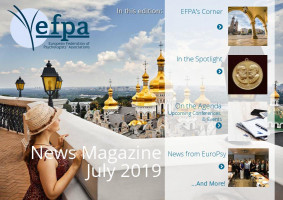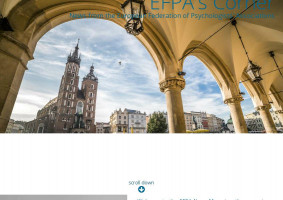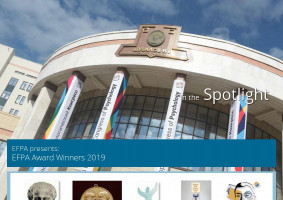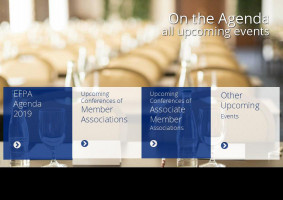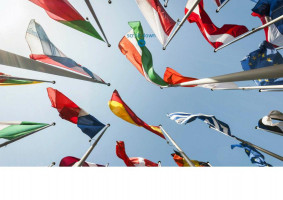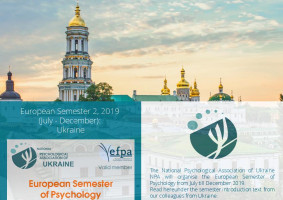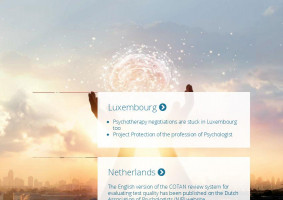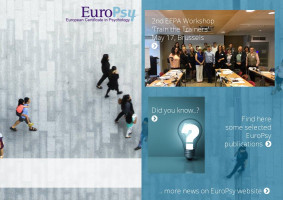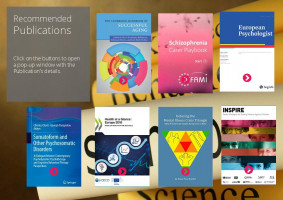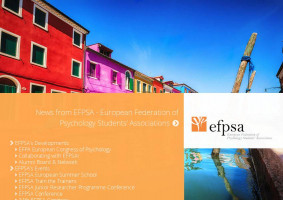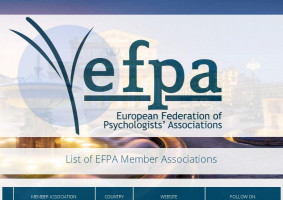News from EFPSA - European Federation of Psychology Students’ Associations
EFPSA’s Developments
EFPA European Congress of Psychology
Collaborating with EFPSA!
Alumni Board & Network
EFPSA’s Events
EFPSA European Summer School
EFPSA Train the Trainers:
EFPSA Junior Researcher Programme Conference
EFPSA Conference
34th EFPSA Congress
_w442_h150_1.png)
We were excited to welcome (student) participants to the booth during the Congress. In addition, we find it an honour to meet and accompany the EFPA Award Winners and to attend keynotes of the Congress.
The EFPSA Representatives have been approachable for questions at all times.
After the Congress, the EFPSA Representatives have attended the General Assembly to learn from EFPA’s working practices to implement in our own Federation.
Collaborating with EFPSA!
EFPSA would like to invite all psychologists willing to collaborate in any way with our Federation and ambitious psychology students to give us consent to contact them.
By sharing your contact information you are giving us an opportunity to contact you and ask you if you would be interested in collaborating with us on a specific project (e.g. being a keynote speaker, presenting your work, delivering a workshop, being part of our webinars etc.).
If you are interested in collaborating with students at Conferences, Congresses or other events, please fill in this link or send an email to Vita Bogdanic ( academic@efpsa.org)
We are currently also very interested in Internships to provide for our members.
Are you looking for an ambitious and internationally-oriented psychologist to be your intern? Or do you know internships spots that look for these kind of students? Please inform us! For internships Tea Jermanis ( vicepresident@efpsa.org) can be contacted.
Alumni Board & Network
The EFPSA Alumni Board (AB) mandate is coming to an end and new Alumni Board members will be selected soon. EFPSA’s aim is to establish a great foundation of Alumni, to benefit from their experience, knowledge and network. We are constantly looking for more EFPSA Alumni to join our Alumni Network. Have you been in EFPSA before? Be part of our Alumni Network by signing up here
EFPSA European Summer School
One of our academic events, the European Summer School (ESS) with the theme “Communication and Learning in the Digital Age” will take place:
from 8th – 15th July 2019
in Lithotopos, Greece.
During this seven-day event, a new cohort of students immerse themselves into a programme of intercultural research where they have the opportunity to join one of six the research projects led by a PhD supervisor in planning and implementing a 12-month study. Apart from this, the programme is enriched by a variety of lectures given by professionals from relevant areas of psychology.
Each year, all lectures and research are set against a theme, chosen to reflect a field of contemporary psychology.
Since 2011, all ESS participants completing the training programme and committing to the research project have been invited to join the Junior Researcher Programme, extending the European Summer School from a one-week Event into a fully structured 12-month research programme.
EFPSA Train the Trainers
One of the most prominent Trainer’s Event of EFPSA, the Train the Trainers (TtT) will take place:
between 13th – 21st July
in Nea Dimmata, Paphos, Cyprus.
In 2010 the first EFPSA Train the Trainers Summer School was organized to educate psychology students to be able to support the organizational development of EFPSA. Since then, the TtT has been a popular yearly event.
Through this event a high quality first level trainers’ education for 12 carefully selected participants is ensured.
These 12 participants will later be supported and mentored on their way to the EFPSA Trainers’ Pool.
EFPSA Junior Researcher Programme Conference
The EFPSA Junior Researcher Programme Conference (JRPC) concludes a one-year cross-cultural research project of six students led by a PhD or PostDoc Supervisor.
The research groups started their research one year ago in the Netherlands and will now present their research to each other and there is an Open Day for local students to present their own work.
This year’s JRPC will take place
from 24th – 27th August
in Belgrade, Serbia.
EFPSA Conference
The EFPSA Conference is a biennial event and places a particular emphasis on its scientific programme. It brings together around 150 students from all over Europe for four days of lectures, workshops and student presentations.
During the Conference, there is an open day, which consists of approximately 30 students from the hosting country/region joining the Conference for one day, to get an opportunity to learn, partake in the lectures and network with the participants.
This year’s EFPSA Conference will take place
from 21st – 24th November 2019
in Prague, Czech Republic.
Its theme is “Environmental psychology: “Humans in their surrounding world”. This relatively young psychological discipline was established in the 1960s and has been changing its specific focus over time. However, it is built around one particular question, which is “How environment impacts our experience, behaviour and well-being, and in the same time, how do we impact the environment by our activity?” By its novelty it is reacting to real and actual topics and thus it is helping us to understand human and the surrounding world.
Therefore the goal of the Conference is to facilitate the participants the insight to the research and erudite perspective of the leading professionals of the field and open the discussion about actual topics to the field of Psychology.
Would you like to participate in the EFPSA Conference? Registration is available until the 30th June 23:59 CEST. Follow this link
Or would you like to contribute in another way? Check out the website
34th EFPSA Congress
In the second week of April 2020, more than 500 psychologists will gather for the 34th EFPSA Congress in Ireland.
The theme of the Congress will be “Looking to the Future Through the lens of the Past”.
Do you wish to contribute to our Congress or would you like to know more? Contact us through: secretary@efpsa.org
_w532_h178_1.png)
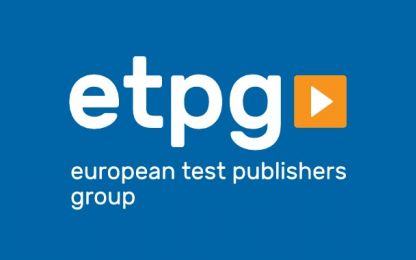
Introduction to the European Test Publishers Group (ETPG)
Read more here
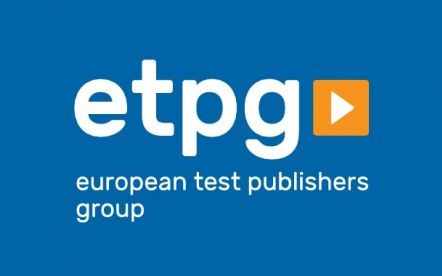
The European Test Publishers Group (ETPG) is a membership organisation, comprising the major psychological test publishers based in Europe. Its mission is to ‘improve European testing.’
ETPG has been holding annual meetings in different European cities since 1991. Its size, shape, priorities and activities have changed hugely in the last 28 years. ETPG was founded by a small number of European test publishers in order to create a network for professional exchange. A number of these test publishers were associated with national psychological associations or were headed up by individual psychologists. Today, ETPG consists of 28 members, representing the large variety of language areas and countries of Europe.
For some years the ETPG concentrated on developing a good two-way relationship with US test suppliers – authors, researchers and publishers. It also sought to promote the pioneering and innovative work on test creation being done in Europe. Among other activities, the group exhibited at international, European and US conferences each year to raise the profile of all aspects of European testing.
The test publishing industry has grown hugely over the last three decades: many publishing groups work internationally; developments in psychological theory, technology, and test users’ needs continue to transform what is tested and how; competition has grown hugely and there is more diversity in what comprises an appropriate test for a particular purpose.
In seeking to improve European testing, ETPG identified six key areas of work:
- raising standards in test design and use;
- progressing creative developments in testing;
- promoting professional use of tests internationally;
- developing fair systems of copyright protection to the benefit of all parties;
- increasing and promoting the benefits of applied psychology to European citizens;
- developing links with test industries outside Europe to raise overall standards.
Based on these, the group’s activities have changed. It’s working with organisations such as the ISO, ITC and, of course, EFPA, on various guideline documents, designed to raise testing standards (while recognising that the environment is changing so fast there is a need to be flexible in defining what “good” looks like). It’s contributing more widely to conferences on testing topics. Most recently it produced five films designed to raise key testing issues and educate test users and policy makers on the history of the area. In the next period the group hopes to work more closely with national psychological associations.
The ETPG is a membership group. Existing members need to vote unanimously for the inclusion of new members who must be companies incorporated in Europe. Its members work in clinical, educational, occupational and other testing areas. The group runs on a tight budget with a part-time executive director and an informal management team made up of members. Many members of ETPG are psychologists involved with international and national policy organisations. The ETPG has no commercial interest in its members activities and specifically precludes the discussion of commercial issues at its meetings. This means it can represent testing supply side issues without the accusation of financial interest in any particular outcome or set of guidelines.
ETPG’s members are in contact with hundreds of thousands of test users each year. They also fund a lot of psychometric research and communicate with universities throughout the continent. On this basis, ETPG feels it can bring long and in-depth experience to key discussions being held within EFPA, as well as other organisations.
This years conference, hosted by Center za Psihodiagnosticna Stredstva, D.O.O, Slovenia and will feature external speakers presenting on technological developments and the testing needs presented by refugees among many others
For further information contact Ian Florance, Executive Director ETPG on +44 7966 509390 or ian.florance@outlook.com.
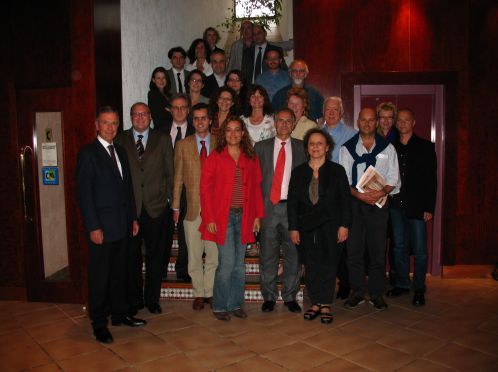
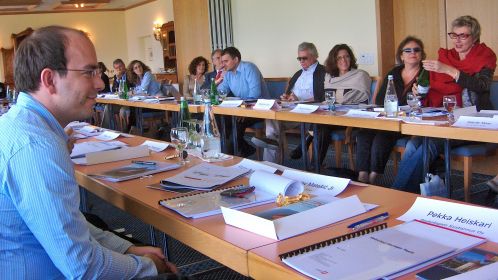
Improving the mental health of children in care worldwide
News from Fairstart Foundation by Niels Rygaard, member EFPA Board Promotion and Prevention
EFPA Promotion and Prevention member Niels Rygaard created the Fairstart Foundation to provide NGOs and governments with blended learning solutions. 460 educated staff from 26 countries are now educated online and train attachment based care to the foster parents, residential and refugee camp staff of more than 30.000 children
In response to the 2009 UN call to improve care for the millions of children and youth who lost parental care, Rygaard invited international researchers and psychologists who contribute to the design of online based educations: how to train local groups of foster parents and group care staff in attachment based practices.
In two year partnerships from Greenland to Europe, Africa and Asia, this low cost solution now enables NGOs and governments to professionalize their staff and train thousands of caregivers with free programs, adjusted to 20 local languages and culture.
Current partnerships are with SOSChildren’s Villages in four East African countries, and Greenland government. The project was nominated for the Robert Roe Award 2017 by the Danish Psychologist Association and international researchers.
Click to view on Youtube videos about Fairstart Foundation programs:
2 minutes examples of how partner organisations apply our programs (with Spanish subtitles)
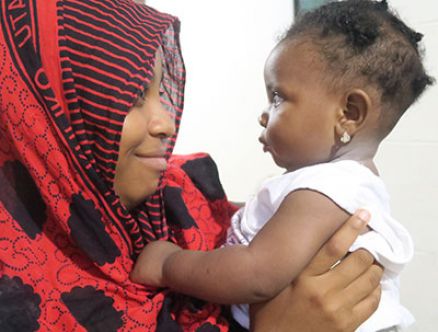
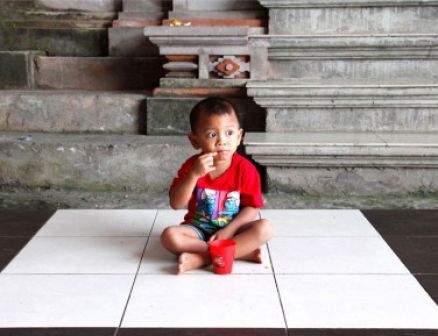
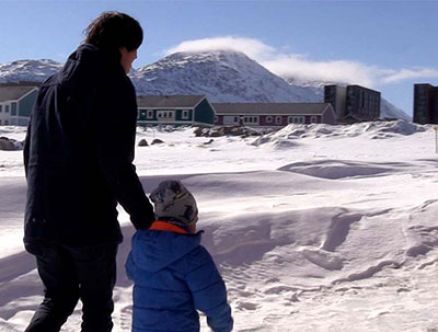

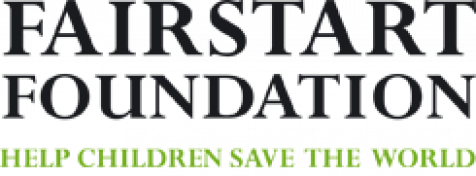
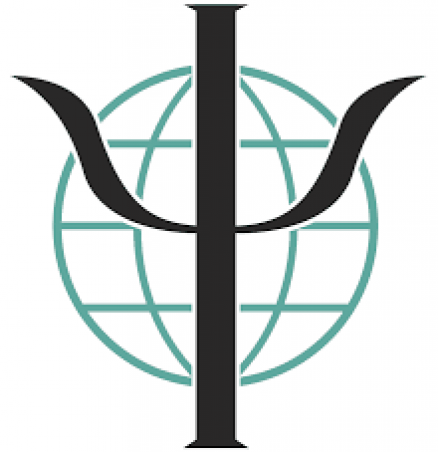
2020 IUPsyS Awards -Call for nominations to National members
Read more here

The International Union of Psychological Science (IUPsyS) is pleased to announce its quadrennial awards detailed below.
The quadrennial IUPsyS awards are:
- Major Advancement in Psychological Science Prize
- Achievement Against the Odds Award
- Lifetime Career Award
- Young Investigator Awards
Presentation of the awards will be at the 32nd International Congress of Psychology (ICP) in Prague, Czech Republic, July 2020.
IUPsyS will meet travel and accommodation costs for attendance at the Award Ceremony in Prague, where each awardee will be expected to deliver an address.
Nominations, which should be received by July 1 2019 (extended), may be sent to the Secretary-General (anndwatts@iafrica.com; cc karl.swain@iupsys.org).
_w1700_h498_1.png)
_w504_h168_1.png)
News from WHO
New WHO Guidelines recommend specific interventions for reducing the risk of cognitive decline and dementia
INSPIRE: Seven strategies for Ending Violence Against Children
Burnout is a medical condition, says the World Health Organization
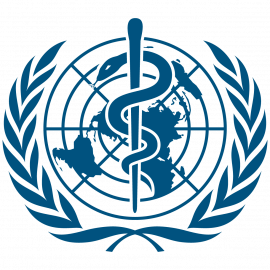

14 May 2019 – People can reduce their risk of dementia by getting regular exercise, not smoking, avoiding harmful use of alcohol, controlling their weight, eating a healthy diet, and maintaining healthy blood pressure, cholesterol and blood sugar levels, according to new guidelines issued by the World Health Organization (WHO) today.
“In the next 30 years, the number of people with dementia is expected to triple,” said WHO Director-General Dr Tedros Adhanom Ghebreyesus. “We need to do everything we can to reduce our risk of dementia. The scientific evidence gathered for these Guidelines confirm what we have suspected for some time, that what is good for our heart, is also good for our brain.”
The Guidelines provide the knowledge base for health-care providers to advise patients on what they can do to help prevent cognitive decline and dementia. They will also be useful for governments, policy-makers and planning authorities to guide them in developing policy and designing programmes that encourage healthy lifestyles.
The reduction of risk factors for dementia is one of several areas of action included in WHO’s Global action plan for the public health response to dementia. Other areas include: strengthening information systems for dementia; diagnosis, treatment and care; supporting carers of people with dementia; and research and innovation.
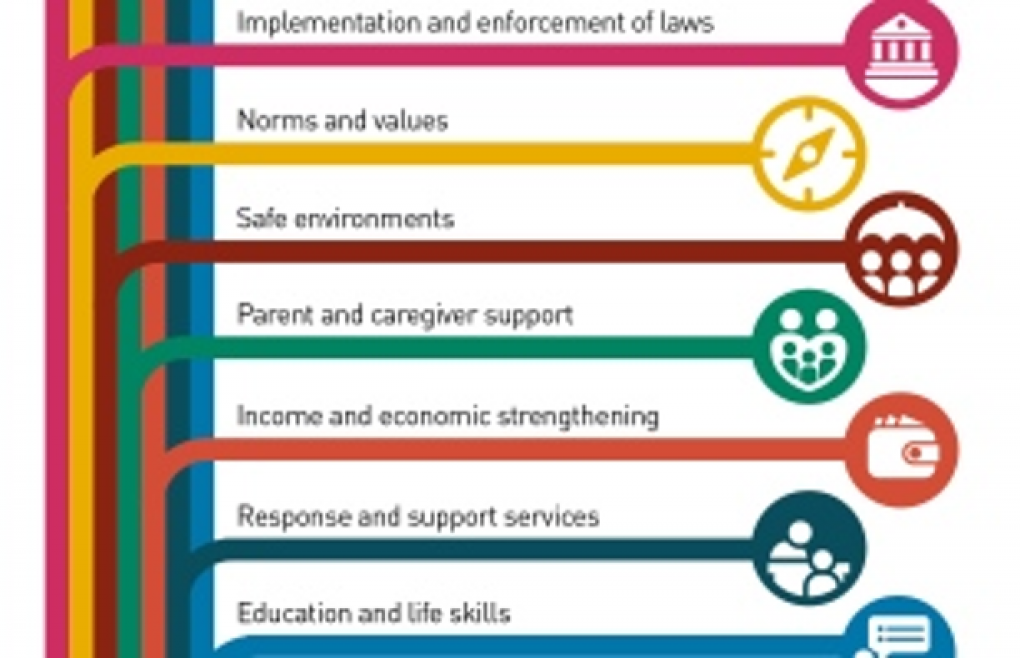
A recent study estimates that up to one billion children have experienced physical, sexual or psychological violence in the past year. INSPIRE is a technical package for everyone committed to preventing and responding to violence against children and adolescents – from government to grassroots, and from civil society to the private sector. It is a group of strategies distilled from the best available evidence and with the greatest potential to reduce violence against children.
Ten agencies with a long history of galvanizing a consistent, evidence-based approach to preventing violence against children have collaborated to develop INSPIRE. These agencies stand together and urge countries and communities to intensify their efforts to prevent and respond to violence against children by implementing the strategies in this package.
The package includes the core document describing what the INSPIRE (available here + link to publication page) strategies and interventions are; an implementation handbook that provides details on how to implement the interventions, and a set of indicators to measure the uptake of INSPIRE and its impact on levels of violence against children.
Discover more about the INSPIRE package
on the WHO website

GENEVA, Switzerland (AFP) May 2019: The World Health Organization has for the first time recognized ‘burn-out’ in its International Classification of Diseases (ICD), which is widely used as a benchmark for diagnosis and health insurers.
The decision, reached during the World Health Assembly in Geneva, which wraps up on Tuesday, could help put to rest decades of debate among experts over how to define burnout, and whether it should be considered a medical condition.
In the latest update of its catalogue of diseases and injuries around the world, WHO defines burn-out as “a syndrome conceptualized as resulting from chronic workplace stress that has not been successfully managed.”
It said the syndrome was characterized by three dimensions:
1) feelings of energy depletion or exhaustion
2) increased mental distance from one’s job, or feelings of negativism or cynicism related to one’s job; and
3) reduced professional efficacy
The updated ICD list, dubbed ICD-11, was drafted last year following recommendations from health experts around the world, and was approved on Saturday. (Read our article in the July 2018 edition of the EFPA newsmagazine)
“This is the first time” burnout has been included in the classification, WHO spokesman Tarik Jasarevic told reporters.
Read more about ICD-11on the WHO website here
Share your news
with EFPA Members?
news@efpa.eu

